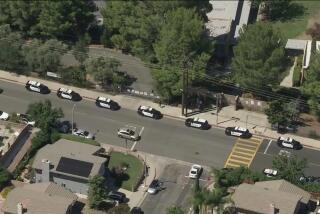Learning discipline
THE DAYS WHEN school was taught “to the tune of a hickory stick” are over, thankfully. Whacking unruly or unprepared kids is no way to teach. Yet when it comes to discipline in Los Angeles schools nowadays, the hickory stick has given way to a metaphorical egg noodle.
The result is that behavior problems frustrate teachers and hinder motivated students in many L.A. schools. A recent California survey commissioned by the state’s Department of Education found that teachers leave the profession primarily because of discipline issues --disruptive students and, occasionally, rude parents.
Consider the following: A boy sexually harassed a girl at Marina del Rey Middle School last year, so his teacher reported his behavior to his mother. Mom’s response? She burst into the classroom and gave everyone the finger.
Then there’s the case of the Audubon Middle School teacher in South Los Angeles who took a laptop computer away from a boy. The student responded by overturning his desk and screaming at the teacher. Veteran public school educators will shrug -- uncivil behavior is par for the course.
In 1994, the L.A. Unified School District recognized the need for a uniform discipline policy to deal with cases such as these. The district, in a typical display of alacrity, is just now, 13 years later, getting around to implementing one. What it’s come up with is as weak as it is late. The policy calls for teachers to praise positive behavior rather than resorting to punishment. Critics say it’s too soft. Departing school board member David Tokofsky aptly calls it the “34 strikes and you’re out” policy.
Worse, implementing the plan will take three to five years. That’s way too long, and it ensures that many more teachers, weary of their jobs and harassed by students, will leave the district, deepening its malaise.
Studies show that well-run schools have a few items in common: Their administrators walk the campus. Their students help set campus rules, and those rules are enforced. Teacher discipline is backed up by principals, and principals’ actions are supported by the central office.
Charter schools have an advantage in this area, with leeway to boot unruly students (and their parents) that regular schools lack. Nonetheless, some of their methods can be adapted.
Steve Barr, founder of Green Dot charter schools, contends that discipline must be strictly and consistently applied. Green Dot, for instance, bars gang members, regardless of their academic aptitude. One brilliant, straight-A student was required to leave, Barr said, because his presence endangered others by gang members coming to look for him after school.
This leads to an aspect of discipline reform that L.A. Unified should consider -- removing troublesome or troubling students to either a different part of the campus or a separate location entirely. Discipline policies embraced by New York City schools allow for this, and it frees teachers to teach.
It also shows that school officials, from the top down, are serious about school rules. Without that, teachers leave and schools fail.
More to Read
Sign up for Essential California
The most important California stories and recommendations in your inbox every morning.
You may occasionally receive promotional content from the Los Angeles Times.










